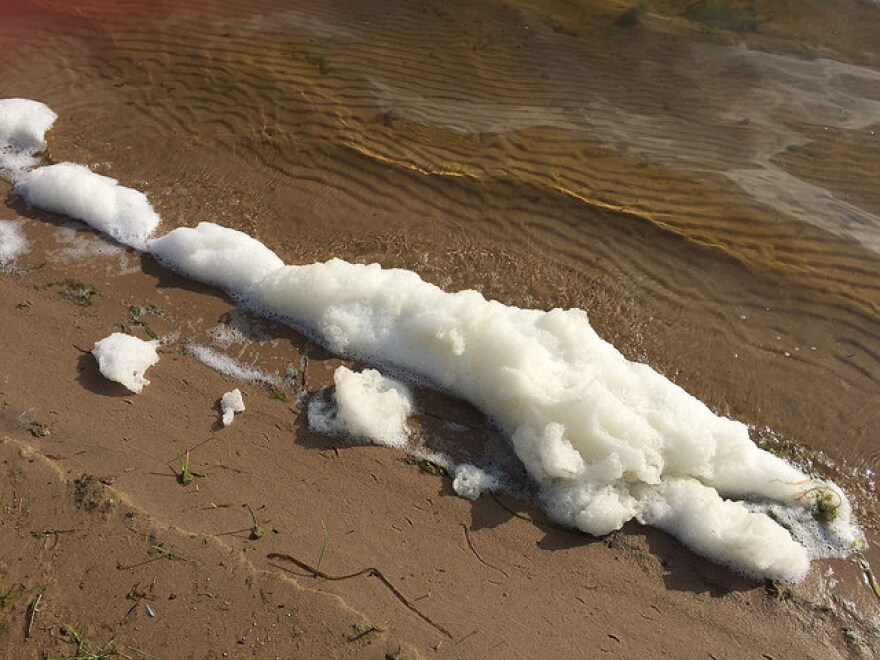Michigan is close to enacting new, tougher standards for PFAS in drinking water. The rules will likely go into effect in the next few weeks.
Meanwhile, a provision in the U.S. House version of the Pentagon budget could force the military to abide by the new state standards when the military agrees to clean up PFAS contamination near former military sites in the state.
Some military facilities in Michigan are sources of PFAS contamination, including the former Wurtsmith Air Force Base near Oscoda, and the Selfridge Air National Guard Base in Macomb County.
Michigan Democratic Congresswoman Elissa Slotkin’s amendment to the House version of the National Defense Authorization Act (NDAA) requires the Department of Defense to follow the “strictest available standard” when cleaning up contamination from two types of common PFAS (PFOS and PFOA) at defense facilities – no matter whether the standard is set by the federal government or a state.
“It’s basically an insurance policy because the EPA really continues to just drag its feet on (establishing) a strong federal standard of any kind,” Slotkin said.
The Environmental Protection Agency has the authority to establish Maximum Contaminant Levels for specific chemicals. There are currently no federal limits set for PFAS contamination.
Slotkin, a former Acting Assistant Secretary of Defense for International Security affairs, says the DOD wants to avoid the financial responsibilities of cleaning up PFAS contamination. She says hopes to have her “strictest available standard” provision regarding PFAS contamination cleanup included in the final version of the NDAA. The U.S. Senate has not passed its version of the NDAA. President Donald Trump has threatened to veto the NDAA over the issue of renaming military bases currently named for Confederate generals.
Michigan’s proposed standards regulating maximum contaminant levels for seven types of chemicals in the PFAS family passed through a committee under the Michigan Legislative Council this week. In the Joint Committee on Administrative Rules (JCAR) hearing on Wednesday July 22, Chairperson Senator Peter Lucido (R-Shelby Charter Township) also expressed frustration at the lack of a federal standard on PFAS in drinking water.
“I’m very upset that the federal government hasn’t come upon itself to go ahead and provide a universal, nationwide standard for PFAS,” Lucido said.
Lucido and State Senator Lana Theis (R-Brighton) expressed concern during the hearing that the cost of cleaning up PFAS contamination detected after the new rules are in place could put a heavy burden on operators of public drinking water systems, and they worried about passing the cost of PFAS cleanup onto consumers and local businesses who pay for the water.
Eric Oswald, with the Michigan Department of Environment, Great Lakes, and Energy, testified that there could be solutions to resolve PFAS contamination that aren't prohibitively expensive, depending on the specific scenario. Oswald gave the example of the city of Parchment, which switched its water supply to Kalamazoo city water after detecting PFAS in its own water supply.
Oswald said EGLE estimates there are about 20 drinking water systems across the state that would be violating one or more of the maximum contaminant levels under the new PFAS rules. Oswald testified that the department doesn't plan to immediately fine water systems that test for PFAS and find they're violating the new rules.
“We will work with them,” Oswald said. “They'll be in violation. There won't be any fines. Our normal process is not to do fines at that point.”
Fines could come later though, if compliance deadlines are missed.
When it comes to cleaning up PFAS pollution at DOD sites, Slotkin said the military would first have to agree to do the cleanup. Slotkin's amendment alone wouldn't compel the military to act. According to The Detroit News, the Air Force is expanding its efforts to clean up contamination of PFOA and PFOS caused by the use of firefighting foam at Wurtsmith.
According to a EGLE press release, when the new PFAS drinking water standards go into effect, they will lower the cleanup criteria for PFAS in groundwater.
“Given that Michigan currently has groundwater cleanup criteria for PFOS and PFOA separately or combined of 70 ppt, the new drinking water rules would lower the groundwater cleanup criterion to 8 ppt for PFOA and 16 for PFOS.”
Here’s a breakdown of the chemical-specific maximum contaminant limits under the proposed new drinking water standards:
PFNA (6-ppt); PFOA (8-ppt); PFOS (16-ppt); PFHxS (51-ppt); GenX (370-ppt); PFBS (420-ppt); and PFHxA (400,000-ppt).
Wednesday’s JCAR meeting adjourned without the committee taking further action on the new rules. By default, they’ll move forward in the rulemaking process. The new PFAS limits in drinking water will go into effect seven days after the Michigan Office of Administrative Hearings and Rules (MOAHR) files the new rules with the Office of the Great Seal.
MOAHR did not immediately respond to a request for comment about the specific timing of when the rules might be filed with the Office of the Great Seal.



